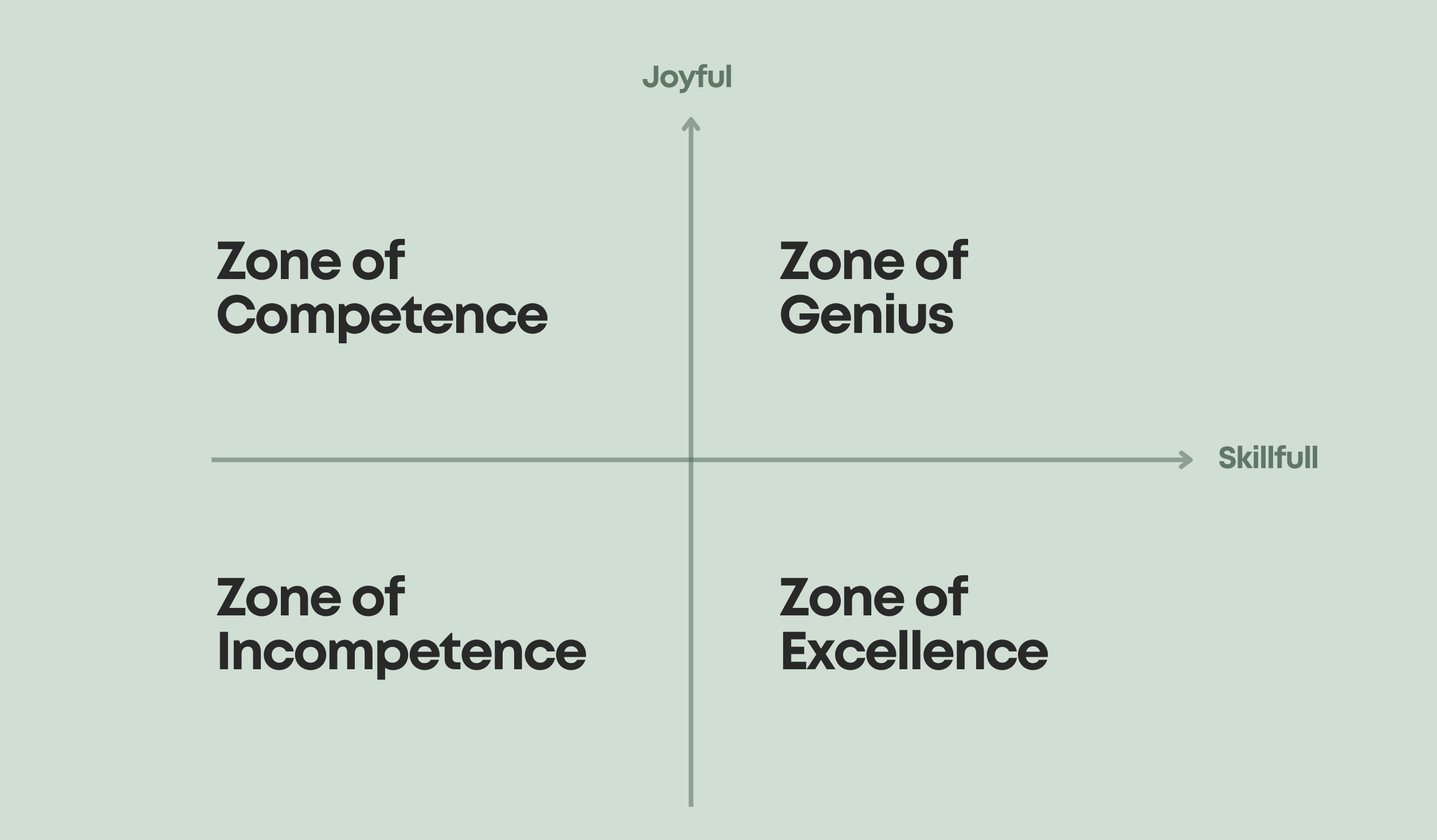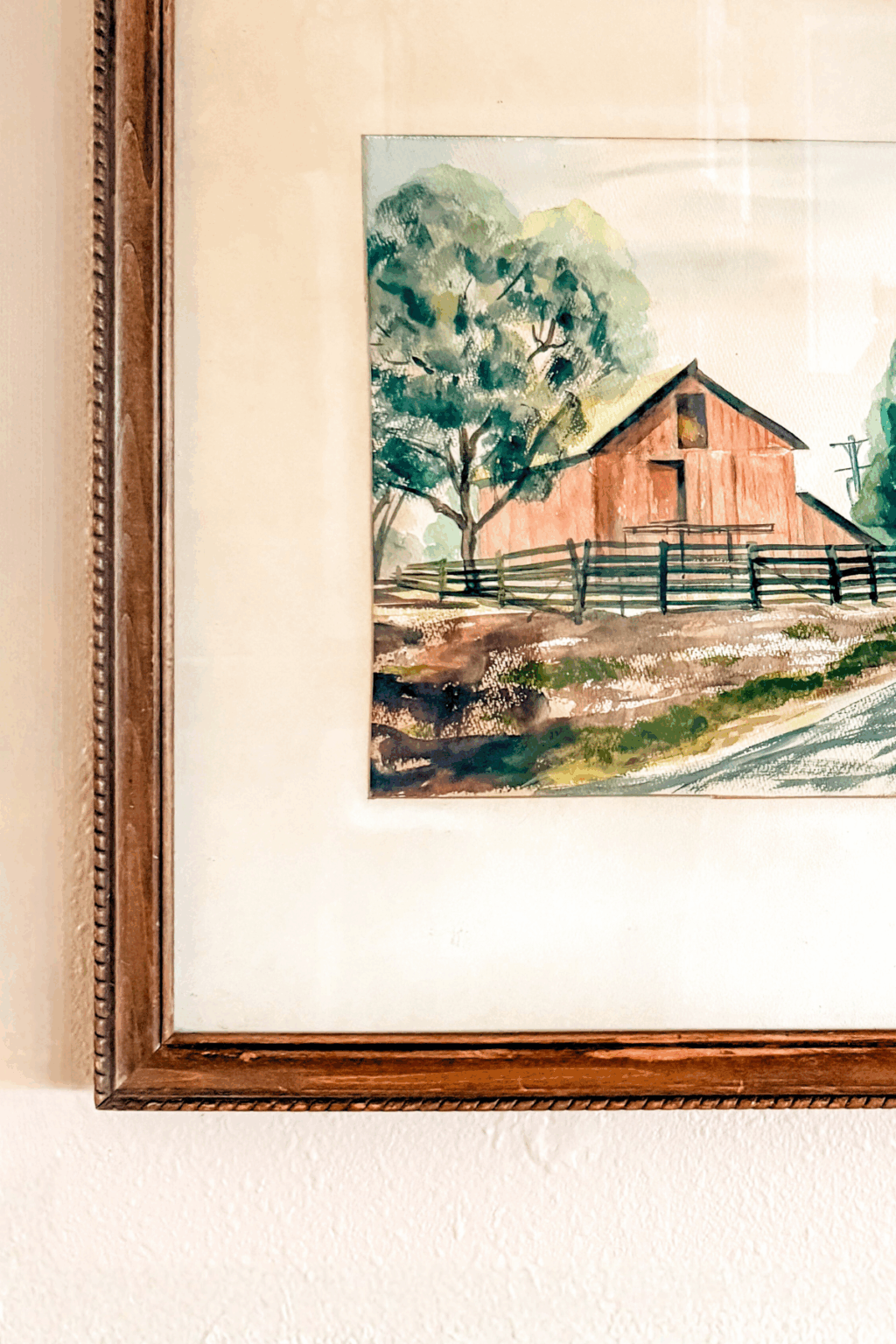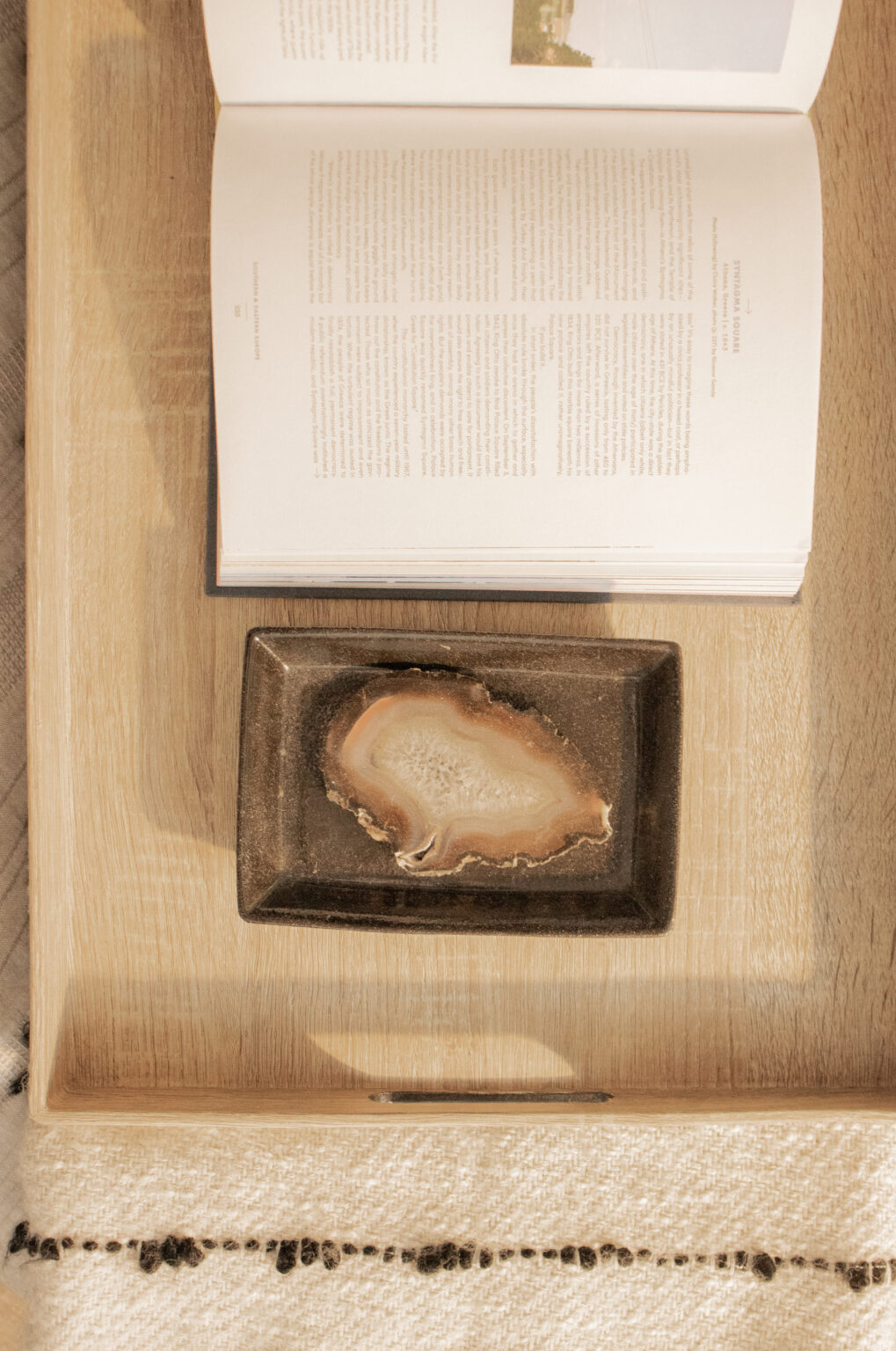Ever feel like your day-to-day work leaves you drained, even though you’re chasing goals that matter to you? Maybe you’re focused, productive, even successful — but something still feels off.
This frustrating disconnect could be a sign that it’s time to reflect on the strengths, passions, and values that define the work you’re meant to do. Finding your “Zone of Genius” (and other work zones!) will help you narrow in on the activities that uplift and inspire you, so you can get more joy out of life.
What is the Zone of Genius?
The “Zone of Genius” concept comes from Gay Hendricks’ book, The Big Leap. This zone lies at the intersection of what you’re great at, what you enjoy most, and what resonates with your deeper values and passions.
When you’re in your Zone of Genius, your work should feel enjoyable and, at times, almost effortless. Spending time in this zone should enrich and rejuvenate you.
Whatever your output is in your genius zone — words, art, decisions, relationships, ideas — it should feel deeply satisfying because it will be bringing you closer to your “big why” and feeding your passions.
Why is finding your Zone of Genius important?
It’s all too easy to get caught up in the ancillary stuff that comes along with life, family, and business. If you don’t use your “zones” to balance your obligations more thoughtfully, it can feel like your energy (and inspiration) disappear into thin air.
Knowing your zones will help you:
- Prioritize tasks that feed your bigger why, allowing you to work on projects instead of getting tangled up in the admin stuff that comes along with them.
- Limit less-rewarding tasks to certain time slots or delegate them to people who like doing the work, in order to protect your time and peace.
- Spend more time enjoying life, recharging, and being inspired so you can be even more powerful when you’re in your genius zone.
No doubt, life will always throw things at us that we find challenging or unenjoyable, and not all of it can (or should) be avoided. But, once you start picking, prioritizing, and scheduling activities based on your zones, it’ll be so much easier to regulate your energy and emotions and fully apply yourself to the tasks at hand.
The Four Zones of Work
The four work zones that Gay Hendricks proposed can help you realign with your passions and figure out where your priorities lie. You could try sorting specific skills (e.g., problem solving, research, physical endurance) into these four zones, but I find it’s more actionable to focus on tasks and activities.

As you go through this exercise, don’t get too caught up in how good you are at something; instead, focus on how it aligns with your interests, passions, and sense of purpose. If you aren’t good, do you yearn to get better? If you are good, is that because you’re driven to be the best or because life circumstances have led you to practicing it a lot?
#1 Zone of Incompetence
This is the area where you’re neither skilled nor effective. Tasks in this zone frustrate you and might feel like a total waste of time. Finding ways to limit these activities is essential for both your efficiency and sanity.
Thinking about my life and business, a handful of tasks come to mind:
- Legal paperwork and agreements
- Coding and web development
- Negotiating and bargaining
- Cooking from scratch
What activities do you feel are beyond your abilities, that you have no desire or capacity to get better at? What tasks are you begrudgingly doing on a daily basis? If you can’t eliminate or delegate them, how can you make them easier on yourself?
I finally admitted that I dread planning a new menu of square meals every week. Now, my Sunday evenings are no longer spent endlessly scrolling recipes and checking the pantry; and my nights are no longer dominated by kitchen messes and meals that, frankly, were never that nourishing or enjoyable. With GreenChef, I’ve reclaimed hours every week that I use more mindfully.
#2 Zone of Competence
This area consists of tasks that you’re capable of doing and, in moderation, might find enjoyable. But, these activities probably still feel like a chore or obligation most of the time. In other words, you wouldn’t really miss this stuff if it was already done for you.
Some examples from my life include:
- Bookkeeping and filing invoices
- Yard work that doesn’t involve pretty plants
- Laundry and repetitive housework
If you have the capacity to outsource tasks in your competence zone, definitely do so. Otherwise, consider using time blocking to schedule these activities thoughtfully. For instance, I tackle mine first thing in the morning since they usually don’t take a lot of creativity or brain power.
#3 Zone of Excellence
Your Zone of Excellence is a satisfying place to be. You’re skilled at these tasks or want to get better at them, but you don’t necessarily feel a drive to become “the best of the best” or spend all your time on them. They’re rewarding in their own way, just not in a way that makes you feel like, “Yes, this is what I was born to do!”
Some of the activities that fall into this zone for me include:
- Anything communication related
- Organizing and decorating
- Baking (especially for others!)
- Gift-giving and letter writing
- Sewing and quilting
The danger of the Zone of Excellence is comfort: It’s easy to stay here because it’s rewarding, but you’d eventually start to feel like you’re spinning your wheels since it’s not where your greatest joy or potential lies.
#4 Zone of Genius
What makes you feel fully alive and in flow, causing you to lose track of time? What do you wake up and yearn to spend your day doing? When you’re doing things within your Zone of Genius, you’re focused, happy, and maybe even admired for your work (or aspire to be!).
A few of my genius zone activities include:
- Perfecting systems and workflows
- Dreaming up and managing projects
- Designing templates and websites
- Any kind of research project
- Helping and mentoring others
How to Find Your Zone of Genius
Sorting tasks and activities between your zones can be a bit tricky — especially if you’re an agreeable person who can feel content doing most anything, or someone with a lot of interests and hobbies. Here’s some advice to help you figure out what really belongs in your Zone of Genius.
Reflect on Your Successes
Reflect on moments where you’ve felt proud of yourself or others recognized your work, whether at home, work, school, or even as far back as childhood. What were those successes driven by? Creativity? Problem-solving? Leadership skills?
Consider both big and small wins, like a time you solved a tricky problem or made a meaningful connection. A notable success almost always points to a passion. Even if it was an obligatory project or activity (like one mandated by work or school), outshining your peers meant you went the extra mile. Why?
If you didn’t enjoy the work itself, what were you working towards that meant so much to you? And, if you did enjoy the work, what aspects of it did you find the most rewarding? Have you often sought out similar work and challenges?
Consider How You Spend Your Time
List the activities that occupy your days. Highlight tasks that you could spend hours doing without feeling drained; these are indicators of your strengths and passions. Likewise, mark the activities that leave you feeling frustrated, bored, or indifferent; these likely belong in your incompetence or competence zones.
Even if you’re doing this for professional reasons, don’t limit your evaluation to your personal life (or vice versa). Think: How do you use your creative energy outside of work? Are there recurring themes in the types of activities or challenges you gravitate toward?
Think about the activities where you feel most engaged or like the work is effortless; they might just fit into your Zone of Genius.
Evaluate Your Skills
What skills are associated with your work, interests, and hobbies? Consider the technical skills, creative abilities, and emotional intelligence they require.
For instance, volunteering on a committee could involve public speaking, collaboration, conflict resolution, note taking, and project management. Meanwhile, hosting a dinner party requires strong time management, coordination, hospitality, and multitasking skills.
Map out the skills you use often and highlight the ones that show up repeatedly. Do your least favorite tasks/activities have certain skills in common? How about your most favorite?
This exercise will help you further narrow in on your strengths and weaknesses. Once you have them written down, ask yourself: “What do I need to develop, want to develop, or wish to avoid as much as possible?”
Take Self-Assessments
Self-assessments offer a structured way to explore your personality, strengths, and work style, helping you uncover insights that might not be immediately obvious to you.
CliftonStrengths 34 or the Myers-Briggs Type Indicator are both popular assessments that can help pinpoint your work style and how you can apply your strengths in life — but they’re pricey at about $59 each.
I’ve most recently taken the Enneagram test and it articulated my strengths and weaknesses so perfectly and gave me a list of behavioral tendencies to consider. It was well worth $20 to me, but you can learn about the nine enneagram types for free and figure yours out on your own.
Identify Your Passions
Your passions might be things that excite you in your life today, but you should also consider what resonates with your core values. Here’s a tip from Sara Blakely’s MasterClass: Think beyond what you love doing and ask yourself: “What breaks my heart?”
When I asked myself that question, my mind was flooded with passions:
- Uplifting the underprivileged and disadvantaged
- Caring for domesticated animals and protecting wildlife
- Helping empower others professionally and financially
- Overcoming “hype culture” and inauthentic content
These kinds of passions give us purpose in life. They’re deeply tied to our morals and can guide us toward volunteer work, philanthropy, meaningful careers, and supporting (or building!) brands that give back.
You also have passions that aren’t altruistic in nature (even if you haven’t found them yet); things like surfing, traveling, knitting, baking. I call these passions “soulful pursuits.” They’re rarely tied to a greater purpose, but they’re deeply fulfilling and bring you pure joy in a way not much else can.
Understanding all of your passions will help you identify the tasks, activities, and skills that help you feel more connected to them and those are the things that belong in your Zone of Genius.
Connect The Dots
Looking back at the above exercises: What overlaps, stands out to you, or shows up repeatedly? Think about ways you can combine your skills and interests to better align with your passions.
A couple years ago, I had become so burned out running PR campaigns for big names that I considered a major career change. But, when I sat down and thought about it, I realized I could take my skills and shift my focus to well-deserving creatives and nonprofits — and my passion for marketing was reignited.
But, realignment doesn’t have to mean a major overhaul. If you own a business, consider exploring new service offerings or taking a “one-to-many” approach through new content initiatives, like starting a podcast, hosting a workshop, or creating a course.
Spinning up meaningful new combinations of your interests, skills, and passions might also mean getting involved with community initiatives, events, or charities — like Surfers for Autism or For Goodness Cakes. Whatever it looks like for you, find ways to explore and embrace your Zone of Genius in more aspects of life.
Cultivating & Embracing Your Zone of Genius
The beauty of finding your zones is the ability to focus more on what truly matters to you and reframe your mindset on the things that don’t; it’s a shift that elevates your entire sense of well-being. Here’s my advice for getting even more out of life using your zones.
Cut Back On Non-Genius Work
Minimizing tasks in your incompetence and competence zones frees up time to focus on what you do best. There are a few ways to cut back in these areas:
-
Eliminate it: Does it really have to be done? Does it have to be done so often? Really think about the things you do out of guilt or a sense of obligation, like being over-involved in committees or attending too many social gatherings that don’t fill your cup.
-
Reimagine it: Is there a way you can make unlikeable things more enjoyable or even more meaningful? Can you find ways to automate them or get more efficient at them? Curbside pickup, taking calls on-the-go, and better email filters are all simple examples that have added up to big gains in my life.
-
Delegate it: If a task has to get done, do you really have to be the one to do it? Consider how much that time and energy is worth. You can outsource just about anything, but also consider what can be swapped or rotated with the people around you.
If you’re not sure you’re busy enough or profitable enough to afford a virtual/personal assistant, think again! I’ve got a handy guide with tips on setting up a budget-friendly arrangement.
Share Your Interests With Others
One of the most accessible ways to find greater meaning in your interests and skills is to share them with others. You don’t have to be an expert; if you know more than the person you’re talking to, you’ve got something to teach them.
Thought leadership — whether that means writing guides, blogging, speaking at events, or mentoring a friend — is not only rewarding, but it also gives you the opportunity to see things with fresh eyes and ponder new questions.
You can also lean into your genius zone via social media, allowing you to find community, learn new things, and even monetize your passions through digital products, affiliate marketing, or sponsorships.
For instance, Laura (@fosterparenting) began documenting her journey as a foster parent. She created a 1M+ strong platform where she shares advice and resources, amplifying her impact and creating a new income stream that aligns with her deeper calling.
- What It Means To Become a Thought Leader
Come Up With Meaningful Challenges
Setting new challenges or goals for yourself can help you spend more time in your genius zone and find new ways to combine and embrace your strengths.
For instance, if you love photography, you could challenge yourself to take 12 themed photos and turn them into a calendar. To make the challenge even more meaningful, you could gift them to friends or sell them for charity.
If connecting with others is something you want to embrace, you could host a block party or organize a game night. Or, you could combine your love for community with your love for exercise by starting a running club or other group.
My personal challenge for 2025 is to take on at least five pro bono marketing projects for nonprofits.
Make Passion-Driven Purchases
Even small decisions, like the brand of cereal you buy, can become a little bit more meaningful when you get extra choosy about the companies and causes you support.
For instance, I adore Bombas socks (especially the gripper slippers!) because they’re super comfy and they donate one pair for every pair sold. I also love seeking out unique vintage and handmade items in my quest to fill my home with meaningful, inspiring things.
For you, finding meaning in your every day choices might mean choosing a locally-owned auto shop next time you get an oil change or shopping at the farmer’s market more often. You’ll be amazed how much these small, intentional steps can uplift you and strengthen your values.
Embrace Your Genius At Work
Whether you’re deciding on what your Instagram vibe should be or introducing yourself to someone important, a personal brand statement can be your North Star. This statement sums up what you do best, what you stand for, and why you’re unique, helping you stay aligned with your “big why” and passions.
You can turn to your personal brand statement to help you:
Communicate your values and strengths in a clear, concise, and authentic way.
Decide what to share/pitch/write/teach based on the most compelling, memorable, and meaningful aspects of your personal story.
Keep your image consistent and make sure your style/voice/tone reflects the essence of your genius zone.
Even if you don’t directly share it with anyone else, writing out your personal brand statement will help you take the right risks, chase the best opportunities, and say “no” to things that don’t truly align with your Zone of Genius.
- Writing a Personal Brand Statement
Defeat Your "Upper Limit"
Have you ever felt a sense of guilt about how much you’re “taking” from life? Do you ever feel like you don’t deserve more or fear that, if you keep getting more, you’ll suffer negative consequences? Gay Hendricks calls it the “Upper Limit Problem.”
Without us realizing it, our subconscious minds place a limit on how much success, wealth, happiness, love, and goodness we can “allow” ourselves to have. If things start to exceed that limit, an interesting phenomenon happens: We start to sabotage ourselves.
This is our subconscious mind’s way of bringing us back within our “limits” — a place of familiarity and comfort. Somewhere we feel safe and secure, where we know we’ve been able to survive. The problem? You can’t keep growing if you stay within these illusionary limits.
As you begin spending more time in your Zone of Genius, you’ll need to learn to recognize when your subconscious mind is holding you back so you can keep embracing more.
- Self-Sabotage & Survival: How to Defeat Your Upper Limits
What's Next?
Finding your Zone of Genius will help you unlock a life that aligns with your truest sense of self. That means more moments of pure, blissful joy and being empowered with a greater sense of purpose in this world.
Start small, stay curious, and trust that the more you operate from your place of brilliance, the more doors will open to meaningful success. Check out these other guides to help you find lasting fulfillment in your work and business.
- The Media-First Marketing Model
- Getting Started With Earned Media & PR
- How to Write a Media Pitch
- Circular Content: Share & Repurpose With Intention
- How to Identify Your Zone of Genius





